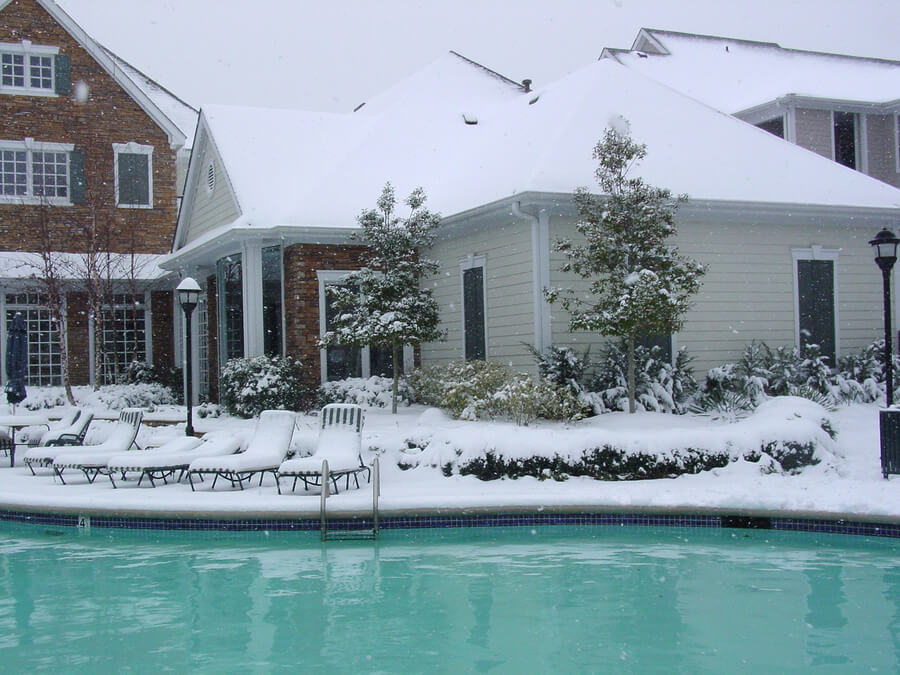Combat the Coming Winter with Professional Pool Maintenance Insight
I’ve worked outdoors in a few different climates most of my adult life. In each of those environments, I’ve always had a love-hate relationship with the wind. In the hot Iraqi desert, the wind was a wonderful ally—until it got so strong that it blew sand into my eyes. Near the beaches of Dover, Delaware, on a flat and sparse Air Force base, I figured out that layered clothing cannot combat a strong nor’ easter. Most homeowners come to loathe the effects of the wind’s power: roof damage, cold air forcing its way into builder-grade windows, and leaves everywhere—all over vehicles, walkways, grass, gutters, and pools. This fall, many of our Dallas-area neighbors have also experienced the most brutal of all wind-related weather events—a tornado that cut a path of destruction through many neighborhoods.

While I am pro-wind (definitely during summer months, while kite flying and whenever I need a little wind in my sails?), I have to admit I often curse it during fall and winter months. Wind causes debris to clog poolside skimmer baskets, slows the rate of temperature rise for heating bodies of water, and redirects water feature flows. Let’s see what, if anything, can be done about the wind (spoiler alert: nothing can be done, but we can do things more wisely).
As waterfalls descend into the pools from which they were drawn, water is directed by spouts or dams or even by carved grout joints. Once the water is falling through the air, it is vulnerable to crosswinds or headwinds. Even the slightest bit of air movement can cause splash out to occur, sending water outside its intended destination. This can lead to water loss and unsightly puddles of water on deck surfaces. It can also increase calcium deposits formation on water feature walls or other nearby surfaces.
Regular Maintenance Protects a Heated Swimming Pool
For heated pools, aerated water accelerates evaporation. If you choose to heat your pool, run any water features you have only as long and as often as necessary to keep them from getting stagnant. The two factors that contribute to pool and spa heat loss are surface area and wind across that area. So, start heating your pool or spa earlier than you normally would if the forecast calls for blustery winds, especially if that pool or spa is unusually spacious. The wind will rob you blind when it comes to energy loss.
The image of wind literally stealing heat from a pool is goofy, yet we know that wind constantly relocates objects that are less dense and more prone to take flight. If leaves and acorns can settle onto the surface of a pool, and if seedlings and other tiny debris can still be seen, imagine what microscopic objects and organisms fall lightly onto and into your pool because of wind. We have to battle the wind with some weaponry. First, always clear out your skimmer baskets to keep the flow of water going into and through them. You should also be sure to net out leaves and other surface debris as often as practical. If you have a suction-type cleaner, I would recommend only valving the suction system for “cleaner mode” a couple of hours per day. At the very least, you should switch the valves to pull hard through the skimmers as often as it is valved for greater suction. The dirtiest part of pool water is the top couple of inches, and a suction cleaner diverts from skimmer action. This means the dirtiest water does not get drawn into the filter as readily as it should.
Finally, warn your landscaping workers that running leaf blowers around pools is a crime punishable by death.
Kidding.
Don’t Forget About Pool Debris Removal
Finally, when it comes to getting debris off the floor of a pool (ostensibly brought into the pool by the wicked wind), your best weapon is a boosted-pressure side cleaner. These usually have half-inch diameter hoses and require a booster pump. This pump provides added pressure needed for propulsion and for putting up debris into a mesh bag using Venturi action, where the effects of increased upward water flow through small orifices lifts debris into the bag. If you have any other type of in-pool cleaner, and if you have enough amperage and space for a small new pump, we can convert your system. This way, you can draw more water through skimmers and still clean the floor of your pool.
Yes, the wind is an extraordinary and necessary part of the earth’s atmosphere. Life flourishes because wind performs all sorts of tasks that would never get done without it. This is why we must learn to do a little dance with the wind—far more practical than trying to stop the wind from being windy. Select Pool Services has the experts who know how to convince wind, water, electricity, and fire to get along for the good of pools and pool owners alike.
